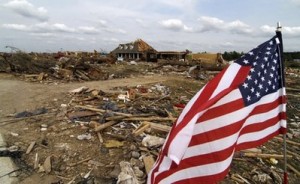BIRMINGHAM, Ala. – Southerners turning to their faith to make sense of the devastation left behind by the second deadliest

tornado outbreak in U.S. history also will be counting on the federal government for help, which Obama Cabinet members assured would come quickly.
Homeland Security Secretary Janet Napolitano toured hard-hit neighborhoods of Alabama and Mississippi on Sunday to offer condolences and pledge support.
“This is not going to be a quick comeback or an immediate (recovery) but it will be, in my view, a complete one,” she said in shattered Smithville, Miss., where little was left standing.
Federal officials already have said several areas are eligible for disaster relief, including 28 counties in Alabama and four in Tennessee.
The storms that roared across the South last week flattened churches and crushed the homes of pastors and parishioners in a ragged stretch from Mississippi to Virginia. At least 342 people were killed and thousands more hurt.
So on the first Sunday after the disaster, believers streamed into houses of worship to give thanks for being spared, to mourn the dead and ponder impossible questions. Why did some survive without any explanation? Why did others die for no apparent reason?
Many people in this highly religious region saw God at work, even amid the devastation.
“God just put his big old arms around us,” said Peggy Blevins, 59, of Rainsville, Ala. “I don’t understand why he takes some people and leaves others. But I thank him just the same for protecting us.”
When the storm drew near, she and her family hid in a hallway of their house. She believes they survived only because some trees fell on the house, pinning it down and preventing the tornado from hurling it through the air.
“To some people it might sound cold, but God does have a plan,” Blevins said. “I know I sound like one of those Southern Baptists, but I am.”
In most small towns around here, churches serve as community centers, town halls and gymnasiums. Besides Sunday services, they host Boy Scout troop meetings, neighborhood voting, bake sales, basketball games and Wednesday night prayer meetings.
Some churches were wiped out. Some of those left standing have become headquarters for rebuilding.
American Christian Academy, a private school in Tuscaloosa, hosted a service at a football stadium within walking distance of neighborhoods where several churches were wiped out. The school distributed food, clothes, Bibles and other supplies to residents who came to worship.
“We’re hoping to feed them and give them some spiritual food,” said Rob Cain, the school’s athletic director and campus pastor.
Lisa Thompson, 37, her fiance and her daughter came to the service because they don’t know if their church, College Hill Baptist Church, survived. They haven’t made it past the police checkpoints that have sealed off the area.
“My faith is stronger now than ever,” she said. “I know God will test you, but it can’t be nothing but stronger.”
Thompson, whose home in a different part of Tuscaloosa was destroyed by the tornado, said she has found strength in the help that her family has received from volunteers who flocked to the city after the storm. She hoped to volunteer her own time at the school.
“I had to do something,” she said. “How can I not? We’re still here.”
Disaster-relief groups from various denominations were quick to arrive in shattered neighborhoods. For Macolee Muhammed, the first volunteer who emerged was Dustin Casey from Southern Baptist Disaster Relief.
Muhammed accepted the prayer of a relief worker who stopped by what was left of her Birmingham home. It didn’t matter that she was Muslim and he was a Southern Baptist.
The 61-year-old was full of worries: Were the power lines strewn around the neighborhood live? Can the federal government help her? She told Casey she hoped she wasn’t going insane.
“I haven’t slept since April 27th,” she said.
Casey assured her that her reaction was normal for the circumstances.
“There is hope,” Casey said. “One day at a time is what you’re going to have to do. This is a life-changing experience.”
Muhammed said she had no job or insurance for her house: “For me to start all over, it would be like me being a hobo.”
Casey suggested they pray, and Muhammed agreed. Casey thanked God for sparing her life and prayed she would be given hope and see “there is a light at the end of the tunnel.”
“Amen,” Muhammed said.
On a day when many turned to their spiritual leaders for comfort, 100 worshippers, friends and relatives prayed beside the caskets of East View Chapel Church pastor Rev. Bob Raper and his wife, Mary “Sis” Hullander Raper. The couple was killed in Apison, Tenn., when a tornado wiped out their mobile home.
“You never know what a week may bring, so be sure you have your priorities where they ought to be,” said Rev. Bob Dasal at the funeral. “If there’s someone I want to say ‘I love you’ to, tell them. … Don’t hesitate, don’t wait. Value what you have been blessed with.”
Poplar Springs Baptist Church in Ringgold, Ga., has been transformed into an informal help center, dispatching volunteer chain saw crews to saw down trees, handing out bottled water and feeding people who are without food and electricity.
Pastor Chris Petty said church members started to understand the destruction as they sent members to assist widows in the congregation after the storm.
“We just showed up at the church and started putting things together and sending people out and saying, `What do you need?’” said Petty, who had just guided a tractor-trailer carrying bottled water into the church parking lot.







